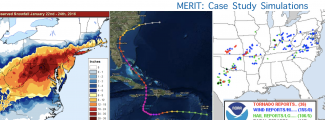The Model Evaluation for Research Innovation Transition (MERIT) project provides a critical framework for physics developers to test innovations within their schemes using selected meteorological cases that have been analyzed in depth. Comparing their results to baseline MERIT simulations will allow developers to determine whether their innovations address model shortcomings and improve operational numerical weather prediction.
For the DTC’s AOP 2018, three high-impact global FV3 baseline cases were selected for in-depth analysis: the Mid-Atlantic blizzard of January 2016, Hurricane Matthew, and the May 2017 severe weather outbreak in the Southern Plains. These cases were chosen after consultation with the Model Evaluation Group (MEG) at NOAA’s Environmental Modeling Center, as each case exhibits known deficiencies in the global configuration of the Finite-Volume Cubed-Sphere (FV3) model. Multiple-day simulations were run using an end-to-end workflow developed to handle the pre-processing of initial conditions, the integration of the model, post-processing with the Unified Post Processor (UPP), and verification with the Model Evaluation Tools (MET). Also, in collaboration with the MEG, the MERIT team has been working on developing and applying unique verification techniques and metrics that will help assess the impact that physics innovations may have on these known FV3 biases. In particular, the progression of certain meteorological features will be assessed through the MET Method for Object-Based Diagnostic Evaluation (MODE) time-domain/storm-relative feature analyses.
The initial focus of MERIT continues to be on existing capabilities available in the global model framework. However, this activity is expected to include high-resolution/convection-allowing modeling as the Stand Alone Regional (SAR)-FV3 becomes available. Providing the research and operational communities with an end-to-end framework will streamline the testing process, leading to more effective and efficient physics development. In addition, it will also encourage community engagement and provide an infrastructure that supports R2O and O2R.
See https://dtcenter.org/eval/meso_mod/merit/.
